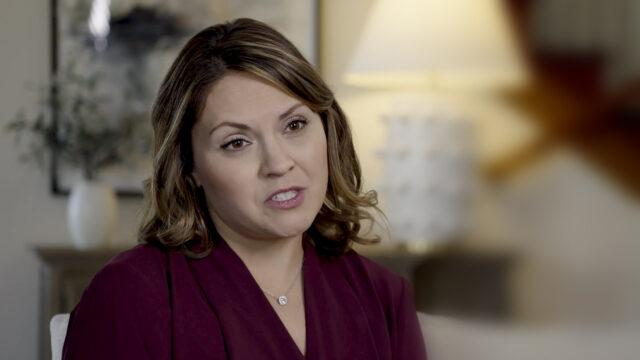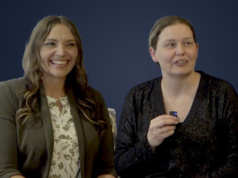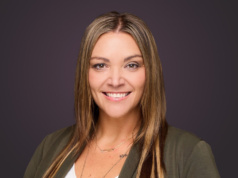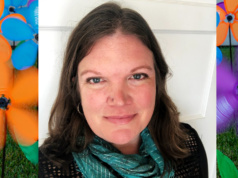Welcome back, everyone, to Answers for Elders Radio Network. And we’re here at the bottom half of the hour as we’re talking about Alzheimer’s and dementia with MorningStar Senior Living. And of course we’re very, very honored to have the director of a program called Lavender Sky of MorningStar, Ms. Rebecca Martin, and Rebecca welcome to the show.
– Thank you so much for having me and our team we’re so excited to have the opportunity to talk about Lavender Sky and all things MorningStar in our passion, dementia and Alzheimer’s care.
– Yeah, you know, it truly is as you probably guys probably know, it’s kind of one of my passions to I, I had a mom that had dementia, and um, you know there’s something about I think that that when you’re exposed like that with a loved one, something grabs your heart and I certainly for that, Um, you know, we all have a story of how we got here. And so obviously, Rebecca, I’m excited to hear because this is such an amazing term that you give, Lavender Sky. And of course I would love to learn more about the program. So, would you explain to us a little bit about your program?
– Absolutely, And I’m going to start with the name, just to begin, because some people ask, why is it called Lavender Sky? That really comes from our tagline at MorningStar, which is to cast a new light, and that is our goal, just knowing that so many people come to us feeling those feelings of despair or anxiety, you know, and wanting to find the best place for their loved one. And also the color dark purple is often associated with Alzheimer’s, so we decided, when we cast our light on that darkness all of those emotions, that we can really bring peace to those families, that we can lift them up to that lighter, more hopeful space. And just doing so lightens that color to lavender, So we we chose to call it Lavender Sky. And for the soothing properties of lavender, the plant, right, which is known to help therapeutically sooth anxiety and to calm. So, a little fun fact about the name, but in terms of the program, it really is more than just a training program. This is our philosophy on memory care in combination of staff training, family support services, and our signature standards that you can see in all 32 of our homes. What we did there is branch off of our mission statement and our commitment to really value all seniors as gifted in contributing individuals. And we thought, how do we continue to do that despite the challenges that come with dementia? How do we continue to draw out those gifts and support our seniors to really feel genuinely valued?
– It’s so important, and certainly, you know, finding a way to maintain dignity I think is so valuable and certainly a lot of times in you know, we get so busy with trying to do our jobs that we forget that place, you know, in the industry. And this is the beauty of what I have noticed with MorningStar is you know, we talk about everyone is created like family, and and it is that core principle of making sure that everyone is honored and has their dignity no matter where their memory, you know, would go. And I think that’s the thing that’s really incredible about what you do. So, Rebecca, when did Lavender Sky start? When did the program actually start?
– So we’ve always had the Lavender Sky training program since about 2013. It has evolved over the years, so now we’re onto Lavender Sky 3.0 in terms of the training itself. But the program has been developing over this past year that I’ve served in the role of Vice President of Memory Care to include those additional layers, the family support and even community training for first responders or anybody that really just wants to have a greater understanding of dementia and Alzheimer’s. So it has has evolved over the years.
– Yeah, and I’m sure that as you’ve evolved, there’s new breakthroughs all the time that are happening. And then obviously your program helps to integrate that into communities. Correct?
– Absolutely, Yeah, it really does, and so it really shapes all of our community offerings because the three pillars, and I know Ignacio touched on this a bit just a few moments ago, but the three Pillars of Lavender Sky are to enter, embrace, and explore. And what that really means is to enter the reality of our residents. So wherever they find themselves, you know, whether it’s living in the past um or experiencing a delusion, our approach is to really enter wherever they are at to connect with them. So we’re never going to convince them or even attempt to tell them those feelings or that experience is not real, but get creative so that we’re right there with them. And that’s how we speak to them and engage them.
– It’s so important for families to understand that because obviously if you have a loved one that they have a different reality, like Ignacio was talking about the story earlier, about the woman doesn’t recognize her husband every day. Okay, that’s a key moment of how do we handle things like this? And this is something that you guys can help families with in that whole philosophy. Am I correct?
– Absolutely. Once we’re able to support families to understand how to creatively enter their loved one’s reality, their engagement is so much more fruitful than coming in and having these frustrating conversations where they may feel like I’m not getting through to mom or she just doesn’t making sense anymore. And when they can change their approach to be more creative, they can walk away smiling, you know, like that was actually fun. I actually enjoyed that conversation because Mom wasn’t distressed by it at all. I didn’t walk away feeling like it was pointless. But um, they really have the tools that they that they need to connect. And that goes for our staff and also families teaching those skills.
– Yeah, and and to have that kind of uh support network that you offer for families. I mean, I think we don’t we take it. We don’t take really realize how valuable it is until you know you’re without it. I know when my mom passed away, you know, and I was in my grief process, there were times that I would think think, you know, I was so grateful for the staff that helped me as a family caregiver. I don’t know how I would have functioned had I not had a network like you know, like yours. Because it’s important that we understand the whole process of what’s happening. It’s important that families understand that they’re not alone in this process. They find a community. You guys are doing caregiver support groups. That’s that’s huge in itself, which is so amazing. So obviously you guys have kind of an all encompassing type program, which is great. So Rebecca tell us a little bit. Now, you have the program, you integrate this program in communities, how do you do that?
– So we require 100% of our staff to go through the Lavender Sky training. So whether you work in culinary, housekeeping, the front desk, anybody in our community, we want them to have that deeper understanding of what dementia is because as we know, 70% of our residents, even in assisted living, can have some cognitive challenges. So we want them to be able to identify when they might benefit from additional support or how to redirect somebody in the assisted living environment that may have some cognitive challenges as well. And also we just want everyone to feel fully comfortable and equipped to step foot into our reflections neighborhoods, our memory care sections of the community, and feel confident that they know how to engage with a resident, how to redirect them if necessary, And really understand with great empathy, what’s physically going on with their cognitive decline.
– Sure, Sure, and really helping. You know, when you’re talking about with staff members, that’s significant. Something could happen in a you know, in a hallway or you know. I know with my mom, you’re talking about cleaning staff. My mom used to have the paranoias over the cleaning people that would go in and they’re snooping in my things. I’m my mom, They’re not snooping in your things. But but that’s the thing that I think there again, I had to learn that that was her world, right, So how do you address that? How do you work with that? And I think that’s so key with staff members all the time because they’re running into that, I’m sure all the time.
– Mm hmm. Absolutely. Yeah.
– So, Rebecca, as far as your process, I know you have the Lavender Sky team. This new community in San José is a first standalone from MorningStar, is that correct, in in memory care?
– So out of our 32 communities, West Valley will be our second freestanding memory care. We do have one here in Colorado Springs as well. That was the original, but this is the very first one on the West coast, and I am just so excited for what that team will bring to all of the residents in need to a quality memory care and really the upscale environment that that they’ve built there is just going to be phenomenal.
– Well and certainly, too, with building something, you know, a community like this, you know, there’s specialized care, but the types of programs that you’re putting together, like the different areas and the different functionality all of this. Obviously, there’s been strategies that have happened to create something like this, and I’m sure you’ve been a part of that. How have you come into that process and what have you learned through creating these communities?
– Sure, so, just the need for a variety of different programs that are really personalized to the residents’ preferences and talents. And that’s the third piece of Lavender Sky, that Explore pillar, and how do we explore their rich and diverse history, because we really want the programs to be just as unique as the individuals that live in each of our homes. What I’ve learned over the years is not everybody loves arts and crafts, not everybody loves to sit down in a in a group setting, but maybe one on one or an individual program is really more successful. So how do we really draw the talents of those residents to share back to others in the community and make sure that our programming is really enriching and purposeful rather than just busy work. So, we really have some great leaders in all of our communities with creative minds that have helped to develop the program that will be put in place at West Valley.
– Yeah, well, I think that’s so exciting, and you know, I’m looking forward to sharing this last segment with you guys and talking a little bit about, you know, just really where the future is, where we’re going with memory care. There’s all kinds of breakthroughs that are happening in um, you know, research, clinical research and things like that. And you guys, it’s so such an honor to have with you with us is our and so Rebecca and I we will be right back after this. In the meantime, though, Rebecca, how do we reach you?
– You can reach me via email at rmartin@mstarliving.com. For any questions or support resources, I’m happy to always connect with anybody in need and further be of assistance.
– Well, and you certainly are an amazing organization to all of us. So everyone, Rebecca and I we will be right back after this.













